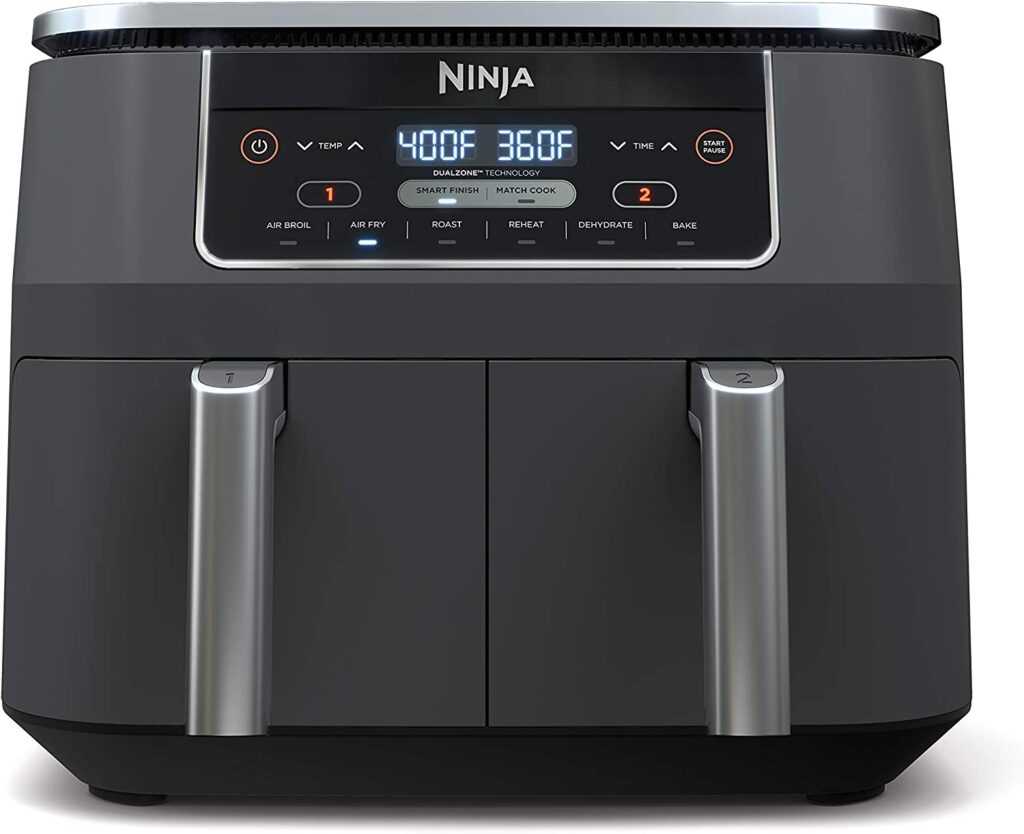Comprehensive Guide To Making Turkey Meatballs In An Air Fryer

In this comprehensive guide, we will delve into the delicious world of turkey meatballs prepared using an air fryer. From the science behind this cooking method to culinary details and mouthwatering variations, this article covers everything you need to know to create perfect turkey meatballs.
Benefits of Air Frying Turkey Meatballs
When it comes to healthy cooking, air frying is gaining popularity for several reasons. Using minimal oil, an air fryer circulates hot air around the food, ensuring a crispy texture without the need for deep-frying. This method reduces the calorie content while still providing a satisfying crunch. Additionally, air frying also eliminates the mess and odors associated with traditional frying methods.
The Science of Cooking Meatballs in an Air Fryer
Cooking meatballs in an air fryer involves a unique combination of heat, airflow, and food chemistry. Understanding the science behind this process can help you achieve perfectly cooked turkey meatballs.
Heat Distribution and Airflow

Most air fryers feature a heating element located near the top, while a powerful fan circulates the hot air around the cooking chamber. This design allows for even heat distribution, resulting in uniformly cooked meatballs. The rapid circulation of hot air also promotes the browning process, giving your meatballs a crispy exterior.
Food Chemistry
Turkey meatballs are comprised of proteins, fats, and moisture. The heat from the air fryer causes the proteins to denature, or unfold, while the Maillard reaction occurs between the proteins and sugars, resulting in the delicious browning effect. The fats in the meatballs contribute to the richness and juiciness of the final product, while the moisture helps to keep them tender.
Cooking Time and Temperature
To ensure that your turkey meatballs are cooked to perfection, it is crucial to consider the cooking time and temperature. The recommended internal temperature for fully cooked turkey meatballs is 165°F (74°C). Cooking times may vary depending on the size and composition of the meatballs, as well as the specific air fryer model.
Culinary Details
Selecting the Right Ground Turkey
The success of your turkey meatballs starts with selecting the right ground turkey. Look for lean ground turkey, preferably with a mix of white and dark meat. The fat content should ideally be around 7-15% to keep the meatballs moist and flavorful. Avoid turkey labeled “extra lean” as it can result in dry meatballs.
Enhancing Flavor with Seasonings
To add depth and complexity to your turkey meatballs, it is essential to incorporate a variety of seasonings. Classic options include garlic, onion powder, parsley, basil, and oregano. Experiment with different dried herbs and spices to suit your taste. Additionally, breadcrumbs or panko can be used to bind the mixture and contribute to the meatballs’ texture.
Binding Agents
Turkey meatballs require binding agents to hold the ingredients together. Traditional recipes often use eggs, breadcrumbs, or a combination of both. Eggs act as a binder, while breadcrumbs absorb moisture, preventing the meatballs from becoming too dense. If you are following a gluten-free diet, consider using almond flour or a gluten-free breadcrumb alternative for binding.
Adding Moisture
Turkey meat can be quite lean, which can result in dry meatballs. To combat this, consider adding moist ingredients to the mixture, such as grated onions, minced garlic, or even grated zucchini. These additions not only enhance flavor but also provide moisture, ensuring juicy meatballs.
Cleaning and Preparing Your Air Fryer

Maintaining the cleanliness of your air fryer is crucial for optimal performance and food safety. Here’s a step-by-step guide to cleaning and preparing your air fryer:
Step 1: Unplug Your Air Fryer
Before cleaning, always unplug your air fryer from the power source and allow it to cool down completely.
Step 2: Remove Removable Parts
Most air fryers come with removable parts such as the basket, tray, and drip pan. Take these parts out and carefully wash them with warm soapy water. Allow them to air dry or use a soft cloth to dry them thoroughly.
Step 3: Wipe the Exterior
Using a damp cloth or sponge, wipe down the exterior of the air fryer to remove any grease or food residue. Be gentle to avoid damaging the surface.
Step 4: Clean the Heating Element
If there are any food particles stuck to the heating element, use a soft brush or toothbrush to carefully remove them. Be careful not to scratch or damage the element.
Step 5: Reassemble and Store
Once all the parts are cleaned and dried, reassemble your air fryer and store it in a safe place until your next cooking adventure.
Tips for Perfectly Cooked Turkey Meatballs
Achieving an ideal texture and flavor for your turkey meatballs in the air fryer requires some expert tips. Here are some useful suggestions:
Preheating Your Air Fryer
Preheating the air fryer is crucial for even cooking. Make sure to preheat the appliance to the recommended temperature before adding the meatballs. This step ensures that the meatballs are cooked evenly from all sides.
Properly Shaping the Meatballs

When shaping your turkey meatballs, aim for uniformity. Ensuring that each meatball is the same size promotes even cooking. Use a scoop or your hands to form each meatball, gently rolling them between your palms until they are round and compact.
Avoid Overcrowding
To allow for proper air circulation, avoid overcrowding the air fryer basket. Leave enough space between each meatball to ensure optimal heat distribution and browning. You may need to cook the meatballs in batches depending on the size of your air fryer.
Lightly Oil the Basket
While the air fryer minimizes the need for excessive oil, lightly greasing the basket can prevent the meatballs from sticking. Use a non-stick cooking spray or brush a thin layer of oil on the basket before adding the meatballs.
Flip the Meatballs
For even browning and cooking, consider flipping the meatballs halfway through the cooking process. This will ensure that all sides receive equal heat, resulting in a consistent texture throughout.
Let Them Rest
After air frying, allow the turkey meatballs to rest for a few minutes before serving. This allows the juices to redistribute, resulting in a moist and flavorful bite.
Variations and Flavorful Options
While traditional turkey meatballs are delightful on their own, why not experiment with different flavors and variations? Here are some ideas to transform your turkey meatballs:
Sweet and Tangy Glaze
Brush the meatballs with a sweet and tangy glaze made from a combination of honey, soy sauce, and Sriracha. This glaze adds a deliciously sticky coating to the meatballs.
Italian-Inspired
For an Italian twist, mix in grated Parmesan cheese, dried basil, and oregano into the meatball mixture. Serve with your favorite marinara sauce and a sprinkle of fresh basil.
Greek-Inspired

Infuse your meatballs with Mediterranean flavors by adding crumbled feta cheese, chopped Kalamata olives, and dried dill. Serve them with Tzatziki sauce for a refreshing finishing touch.
Asian Fusion
Create Asian-inspired turkey meatballs by incorporating green onions, minced ginger, and soy sauce into the mixture. Serve with a side of steamed vegetables and a drizzle of sesame oil.
Checking for Doneness
Ensuring that your turkey meatballs are cooked thoroughly is essential for food safety. Here are some methods for checking doneness:
Meat Thermometer
The most accurate way to check for doneness is by using a meat thermometer. Insert the probe into the center of a meatball, avoiding contact with the air fryer basket. The internal temperature should read 165°F (74°C) for fully cooked turkey meatballs.
Visual Inspection
If you don’t have a meat thermometer, you can visually inspect the meatballs. Slice one meatball in half, and there should be no pink meat in the center. The meatball should be uniformly cooked throughout.
Texture
Fully cooked turkey meatballs have a springy and tender texture. If the meatballs are still slightly firm or tough in the center, they might need additional cooking time.
Delicious Air Fryer Turkey Meatball Recipe
Now that you have a comprehensive understanding of cooking turkey meatballs in an air fryer, let’s dive into a delicious recipe to get you started:
Ingredients:
- 1 pound lean ground turkey
- 1/4 cup breadcrumbs (regular or gluten-free)
- 1/4 cup grated Parmesan cheese (optional)
- 1/4 cup finely chopped onions
- 2 cloves garlic, minced
- 1 teaspoon dried basil
- 1 teaspoon dried oregano
- 1/2 teaspoon salt
- 1/4 teaspoon black pepper
- Cooking spray (optional)
Instructions:
- Preheat your air fryer to 375°F (190°C) for approximately 5 minutes.
- In a large mixing bowl, combine ground turkey, breadcrumbs, grated Parmesan cheese, onions, garlic, dried basil, dried oregano, salt, and black pepper.
- Gently mix all the ingredients together until well combined. Be careful not to overmix to prevent dense meatballs.
- Shape the mixture into meatballs, roughly 1 inch in diameter. Ensure that each meatball is uniform in size for even cooking.
- Lightly grease the air fryer basket with cooking spray or a thin layer of oil.
- Place the meatballs in the air fryer basket, leaving some space between them for proper airflow.
- Cook the turkey meatballs in the preheated air fryer for around 12-15 minutes, or until the internal temperature reaches 165°F (74°C).
- If desired, flip the meatballs halfway through the cooking time to ensure even browning.
- Once cooked, remove the meatballs from the air fryer and let them rest for a few minutes before serving.
- Serve your flavorful turkey meatballs as desired, whether with pasta, marinara sauce, or as a healthier alternative to traditional meatball recipes.
Conclusion
Congratulations! You are now equipped with an extensive understanding of preparing turkey meatballs using an air fryer. From the science behind this cooking method to culinary details, cleaning, preparation, and delicious variations, this guide covers all the essential aspects to create perfect turkey meatballs. Enjoy exploring different flavors and techniques in your air fryer, and get ready to indulge in mouthwatering, healthier meatballs that are certain to become a favorite.
Sources
FAQS On Turkey Meatballs Air Fryer Recipe
Can I Make Turkey Meatballs In An Air Fryer?
Yes, you can definitely make delicious turkey meatballs in an air fryer.
What Are The Advantages Of Cooking Turkey Meatballs In An Air Fryer?
Cooking turkey meatballs in an air fryer has several advantages. Firstly, it requires less oil compared to traditional frying methods, making it a healthier option. Secondly, the air fryer cooks the meatballs evenly and quickly, ensuring a crispy exterior while keeping the inside moist and tender. Lastly, the air fryer is easy to use and clean, making it a convenient appliance to have in your kitchen.
How Do I Season The Turkey Meatballs For The Air Fryer?
The seasoning for your turkey meatballs is completely customizable according to your preferences. Typically, you can use a combination of herbs and spices such as garlic powder, onion powder, dried oregano, dried basil, salt, and pepper. You can also add grated Parmesan cheese or breadcrumbs for additional flavor and texture.
Do I Need To Preheat The Air Fryer Before Cooking Turkey Meatballs?
It is recommended to preheat the air fryer before placing the turkey meatballs inside. Preheating helps in achieving a crispy exterior while cooking the meatballs evenly.
How Long Should I Cook Turkey Meatballs In The Air Fryer?
The cooking time for turkey meatballs in an air fryer may vary depending on the size and thickness of the meatballs. As a general guideline, cook them at around 375°F (190°C) for about 12-15 minutes. However, it is always recommended to check the internal temperature of the meatballs using a meat thermometer to ensure they reach 165°F (74°C) for safe consumption.
Can I Freeze The Turkey Meatballs Before Air Frying Them?
Yes, you can prepare the turkey meatballs in advance and freeze them before air frying. Simply shape the meatballs, place them on a baking sheet lined with parchment paper, and freeze until firm. Once they are frozen, transfer them to a freezer-safe container or bag for long-term storage. When you’re ready to cook, you can directly place the frozen meatballs in the air fryer, just remember to adjust the cooking time accordingly.
What Can I Serve With Turkey Meatballs Cooked In An Air Fryer?
Turkey meatballs pair well with a variety of side dishes. You can serve them with spaghetti and marinara sauce for a classic Italian meal, or with a side of roasted vegetables and a grain like quinoa or couscous for a healthy and balanced plate. Additionally, you can also serve them as an appetizer at parties, accompanied by a dipping sauce like tzatziki or sweet chili sauce.


